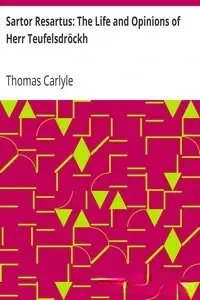Summary
“A tailor-made philosophy, stitched together with satire, mysticism, and existential doubt.”
In Sartor Resartus—Latin for “The Tailor Repatched”—Thomas Carlyle delivers a bold and eccentric work that defies easy categorization.
Presented as a critical commentary on a fictional German philosopher’s manuscript, the book is a philosophical novel masquerading as biography, satire, and spiritual treatise, all rolled into one.
The story revolves around Herr Diogenes Teufelsdröckh ("Devil’s Dung"), a reclusive and peculiar professor of "Things in General" at the University of Weissnichtwo ("Know-not-where").
The unnamed narrator attempts to make sense of Teufelsdröckh’s sprawling work on the philosophy of clothes, which claims that clothing is not just literal fabric but a symbol of all institutions, beliefs, and social conventions humanity wraps itself in.
As the narrator sifts through the professor’s chaotic life story and abstract theories, readers are taken on a journey through despair, spiritual crisis, and eventual rebirth.
Teufelsdröckh’s philosophy challenges readers to strip away superficial layers of society and confront the inner truths of existence, purpose, and transformation.
Published in the 1830s, Sartor Resartus baffled many of Carlyle’s contemporaries with its style but later became profoundly influential—especially among writers like Emerson, Thoreau, and Dickens. It is a proto-existential, postmodern, and metafictional work decades ahead of its time.
